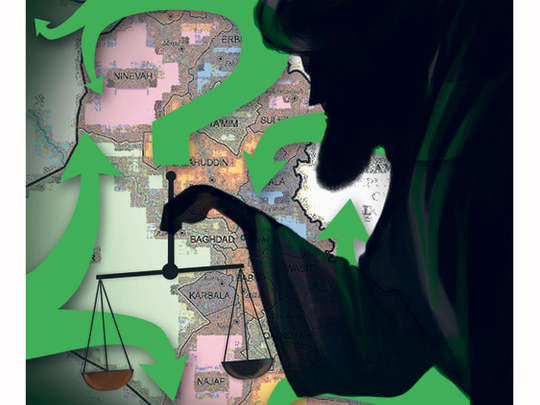
The Shiite politicians in Iraq hold the key to the country's future. They have the choice of being more Iraqi in their outlook, or being more influenced by Iran. They will need to decide if they are going to put the interests of their country first and work with Iraqis of all political and sectarian backgrounds, or whether they will pay more attention to the wishes of the Iranian government.
And this is not just an Iraqi issue, despite all the pious rhetoric claiming that the Iraqi parliament is an internal Iraqi affair. The whole of the Gulf is watching nervously to see which way the new government will go, with every expectation that Iran will garner more influence over the decision of the new government.
Although Shiite power has been obvious from the country's demographics since 2002, when the Americans toppled Saddam Hussain and announced a democracy, it has never been so clear as now, after last week's agonised result of the inconclusive March election. The near dead-heat for the post of prime minister between the Shiite Nouri Al Maliki and Sunni Eyad Allawi resulted in an eight-month political deadlock, which was finally broken by Shiite leaders making up their minds who to support.
When Moqtada Al Sadr, the radical Shiite leader of 42 members of parliament, agreed to an Iranian request to back Al Maliki, it was the end of Allawi's hopes and a powerful illustration of Iranian authority. It was initially surprising that Al Sadr agreed to support Al Maliki, since Al Sadr and other Shiites in the Iraq National Alliance had split from Al Maliki's government in fury when Al Maliki sent the Iraqi army into Basra to regain control from Shiite militias.
The outcome is a government headed by Shiite Al Maliki, supported by Shiite Al Sadr, with the Kurds keeping their grip on the Presidency. The Sunni Allawai has been given a new role as head of a National Security Council, which has yet to be formed and has unclear authority or powers, and also the right to appoint the speaker of the parliament.
The question agonising his Sunni supporters, and Sunnis throughout the region, is whether Allawi has been fobbed off with an offer that gave him no power. Clearly Allawi thought he had been fooled last week, when parliament refused to vote to create the new National Security Council when it met to vote Al Maliki back into power.
There is a real danger that the new government will ignore the large Sunni minority in Iraq, triggering real resentment. The Sunnis were stunned and delighted by the result in March when Allawi won 92 seats, slightly more than the incumbent Al Maliki's State of Law party which managed 89 seats.
But Sunni delight that elections could deliver a result in their favour soon turned to bitter disappointment as the horse trading between the parties lost its direction, and finally deprived the leader of the largest party the chance to form a government.
It remains to be seen where the Shiite politicians with their new power will take Iraq, but two things are already clear: First, the Americans are losing influence very fast indeed, and second, sectarian politics are becoming a reality. The election result was a deep shock to Washington, and part of the reason for the long delay in the Iraqis finding a coalition was American resistance to a Shiite continuing to be prime minister. But in the end, the Americans were unable to muster enough support from any side to achieve what they wanted.
Even the Kurds dismissed repeated American requests for Jalal Talabani to relinquish the presidency to Allawi. And the Kurds owe a huge debt to the Americans after their political safety was protected by the American no-fly zone after 1992 and their autonomy by the American occupiers since 2002. But both Masoud Barzani and Jalal Talabani crudely dismissed US President Barack Obama's and US Vice-President Joe Biden's personal pleas to give in.
Tribal disputes
But Iraq faces a more serious danger if it allows the entrenchment of sectarian politics. If parties run on solely ethnic and religious lines then politics will freeze into tribal disputes over power and patronage. The fact that the Kurds have held the presidency for two terms, that a Shiite will continue to hold the prime ministership, and the Sunnis are providing the speaker, sounds far too like Lebanon for Iraq's good.
Effective politics in the 21st century will be about good governance, and vision to educate people and give them the opportunity to seek a better life. This requires a government with policies that go beyond giving each sect a position, and it requires parties that offer social and economic manifestos rather than sectarian balance.
It is a tragedy for Iraq that the overwhelming need for security has driven its politics into the dead-end of sectarian vacuousness.









